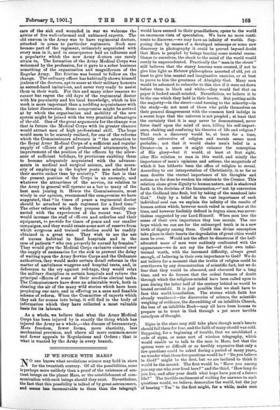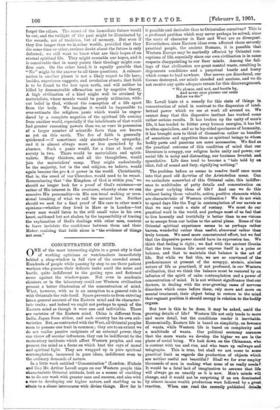IF WE SPOKE WITH MARS P
NO one knows what revelations science may hold in store for the twentieth century. Of all the possibilities, none is perhaps more unlikely than a proof of the existence of sen- tient beings on the planet Mars, or the establishment of com- munication with such beings should they exist. Nevertheless, the fact that this possibility is talked of by great astronomers, and seems less inconceivable to them than the telegraph would have seemed to their grandfathers, opens to the world an enormous vista of speculation. We have no more conti- nents to discover,—we may have an infinity of worlds. Sup- posing that by means of a developed telescope or some new discovery in photography it could be proved beyond doubt that Mars is peopled by beings bearing some mental resem- blance to ourselves, the shock to the mind of the world would surely be unprecedented. Practically the " man in the street " still believes that the starry heavens were created, if not to give him light as Hebrew philosophers asserted of old, yet at least to give him mental and imaginative exercise, or at best to prove to him the greatness of Almighty God. Many men would be ashamed to subscribe to this view if it were set down before them in black and white,—they would feel that on paper it looked small-minded. Nevertheless, we believe it to be the one which they hold in their hearts. But putting aside the majority—in the street—and turning to the minority—in the study—do not most of those who pride themselves on their general disagreement with the common herd indulge in a secret hope that the universe is not peopled ; at least that the certainty that it is may never be demonstrated, never force itself upon the mind of man, killing his self-import- ance, shaking and confusing his theories of life and religion ? That such a discovery would be, at least for a time, terribly subversive of religion and morals seems most probable ; not that it would shake men's belief in a Creator—in a sense it might enhance the conception of His glory—but it would, at least at first sight, alter His relation to man in this world, and minify the importance of man's opinions and actions, the magnitude of which it has hitherto been the office of religion to reveal. According to our interpretation of Christianity, in so far as man doubts the eternal importance of his thoughts and actions so far does he weaken his relation to the Creator. This relation alone gives dignity to human nature, and is shadowed forth in the doctrine of the Incarnation,—" not by conversion of the Godhead into flesh, but by taking of the manhood into God." Only by a belief in the vast importance of each individual soul can we explain the infinity of the results of human action which, however much veiled in metaphor at the time, and however foolishly defined in dogma since, was never- theless suggested by our Lord Himself. When men lose the sense of their own importance they lose morale. The one hope which we can see for the submerged tenth is in a new birth of dignity among them. Could this divine conception take place in their hearts the degradation of great cities would soon be over. Would not the effect be disastrous if the half- educated mass of men were suddenly confronted with the appearance—we do not say the fact—of their own infini- tesimal worth, with the increased difficulty, always great enough, of believing in their own importance to God? We do not believe for a moment that the truths of religion could be overthrown by any demonstration of scientific fact, but we do fear that they would be obscured, and obscured for a long time, and we do foresee that the ordeal furnace of doubt through which the religious-minded have been called upon to pass during the latter half of the century behind us would be heated sevenfold. It is just possible that we shall have to face this world-humiliation. The storms which faith has already weathered—the discoveries of science, the scientific weighing of evidence, the discrediting of an infallible Church, the loss of an infallible Book—may all have been lessons to prepare us to trust in God through a yet more terrible cataclysm of thought.
Signs in the stars may still take place though men's hearts should fail them for fear, and the faith of many should wax cold. Supposing, for a beginning of trouble, that we established a code of signs, or some sort of wireless telegraphy, which would enable us to talk to the men in Mars, but that the system were so difficult or so terribly expensive that only a few questions could be asked during a period of many years, we wonder what those few questions would be ? " Do you believe in God?" might be the first, but we are inclined to think it would be the second. The first would be, " Have you among you any one who ever lived here?" and the third, "How long do you live, and after your death what hope have you of a future life?" The terrible excitement of waiting for answers to such questions would, we believe, demoralise the world, but the joy of hearing " Yes " to the first might, for a while, make men forget the others. The secret of the immediate future would be out, and the twilight of the past might be illuminated by the records, not of tradition, but of memory. But even if they lire longer than we in other worlds, provided that they die some time or other, anxious doubt about the future is only deferred ; we still want to know what are their hopes of an eternal spiritual life. They might resemble our hopes, and it is conceivable that in many points their theology might con- firm ours. On the other hand, it is equally possible that "No" might be the answer to all three questions. A. reincar- nation in another planet is not a likely sequel to life here; besides, experience suggests, and revelation attests, that faith is to be found to the last upon earth, and will neither be killed by demonstrable affirmation nor by negative theory, A high civilisation of a kind might well be attained by materialists, whose morals would be purely utilitarian, with- out belief in God, without the conception of a life apart from the body. We imagine it would be impossible to over-estimate the religious panic which would be engen- dered by a complete negation of the spiritual life coming from another world, especially if the inhabitants of that world had greater reasoning powers than we, or were in possession of a larger number of scientific facts than are known as yet on this earth. The fire of faith is generally quickened — if sometimes only simulated — by sympathy, and it is almost always more or less quenched by its absence. Such a panic would, for a time at least, cut society in two. There would be materialists and spirit- ualists. Many thinkers, and all the thoughtless, would join the materialists' camp. They might undoubtedly be the majority, but in the end religion, we believe, would again become the gre; t st power in the world. Christianity, that is, the creed of the Churches, would need to be recast. Remembering that " the Kingdom of God is within you," we should no longer look for a proof of God's existence—or rather of His interest in His creatures, whereby alone we can conceive His personality—in His continual making or occa- sional breaking of what we call the natural law. Neither should we seek for a final proof of His care in other men's opinions—whether they lived in Mars or in London—but every man would listen to the still small voice in his own heart, saddened but not shaken by the impossibility of tracing the explanation of God's dealings with other men, content to leave inviolate the confidence between them and their Maker, realising that faith alone is " the evidence of things not seen."



































 Previous page
Previous page